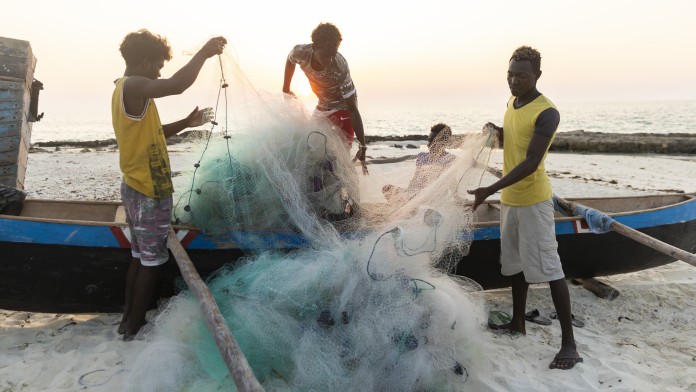As of: 06/2023
The world's oceans are under pressure for many reasons: their resources are being exploited by dramatic overfishing, pollutants and waste often end up untreated in the seawater. In addition, there are conflicting user interests, from offshore wind farms and deep-sea mining to tourism and the fishing industry, all of which put varying degrees of pressure on the oceans in their own way. Climate change is further exacerbating the situation through rising sea levels and higher water temperatures. At the same time, millions of people are directly dependent on fishing - as a source of income and as an important source of protein. In order to put a stop to the strain on seas and coasts and to safeguard their biodiversity for future generations, KfW, together with the German Federal Ministry for Economic Cooperation and Development (BMZ), launched the innovative Blue Action Fund in 2016.

Oceans and coastal regions make a major contribution to global food security due to their high biodiversity: for almost three billion people, fish is a crucial part of their diet. In addition, more than 500 million people worldwide depend directly or indirectly on fishing, 90% of them in developing countries. However, the oceans are heavily polluted due to various influencing factors, and their fish stocks have declined dramatically in recent decades. More than twice as much fish is currently being taken from the world's oceans as would be permissible for a sustainable stock. Climate change is exacerbating the effect by further warming the oceans and raising sea levels. sea levels rise. As a result, coral reefs are shrinking and extreme weather events are increasing. This makes thousands of kilometres of coastline more susceptible to storm surges, destroys the refuges of many fish species and can threaten the livelihoods of millions of people. Conversely, the oceans and their vegetation play a crucial role in climate protection, partly because they absorb 25 to 30% of CO2 emissions. Protecting and preserving the oceans is one of the greatest challenges of the coming decades. At present, however, only a small proportion - between 7 and 8% - of marine areas are protected. The few protected areas that do exist are often insufficiently connected and inadequately managed.
In order to intensify marine and coastal protection worldwide, BMZ and KfW established the Blue Action Fund (BAF) in 2016. It has the legal form of a non-profit foundation. The fund does not carry out projects itself, but finances projects of non-governmental organisations (NGOs) that can strengthen and expand their work through access to public funds. This is because relevant NGOs have the necessary expertise and are operational on the ground. Funding is available for projects that establish new protected areas or expand existing ones; improve the management of existing protected areas; and improve the livelihoods of local communities through the sustainable management of marine resources.
Interested NGOs can submit project proposals following regularly published calls. The BAF selects projects taking into account national and regional conservation strategies, in line with the UN Convention on Biological Diversity, the 2030 Agenda and the BMZ's 10-point action plan on marine conservation. The International Union for Conservation of Nature (IUCN) supports the BAF in selecting projects and providing strategic advice. Meanwhile, the fund is also financed by Sweden and France, which joined in 2017 and 2018, and since 2021/22 also by Norway and Ireland. As a result, the BAF currently has an endowment capital of over EUR 177 million. EUR 30 million of this was added by the Green Climate Fund in 2021 - the BAF uses this to support climate adaptation for coastal residents through marine conservation projects in the Mozambique Channel. The fund is open to further members to expand its reach step by step.
There are now 21 ongoing and three completed projects worldwide, which will be complemented by five more in 2023. For example, Conservation International (CI) is already funding a project around the Galapagos Islands off the coast of Ecuador, Colombia, Panama and Costa Rica on sustainable fishing methods in one of the largest marine protected areas in the world. In this way, economy and ecology are to be better reconciled in this species-rich and at the same time sensitive maritime area. WWF, Flora & Fauna International or the World Conservation Society as well as regional and national NGOs are implementing other projects. For example, protected areas are currently being created in the Indian Ocean and Mozambique Channel, off the coast of Tanzania, off Madagascar and around various Pacific island groups to safeguard biodiversity and livelihoods. More than 350,000 people benefit from the support of the BAF, which since its inception has helped to better manage almost 215,000 km² of marine protected area - roughly the size of Guyana - and added almost 150,000 km² of new protected area. With each additional financier and project, the commitment in favour of seas and coasts can continue to grow.
The project contributes to the achievement of these following United Nations Sustainable Development Goals:
KfW Group
KfW Development Bank
+49 69 7431-4187